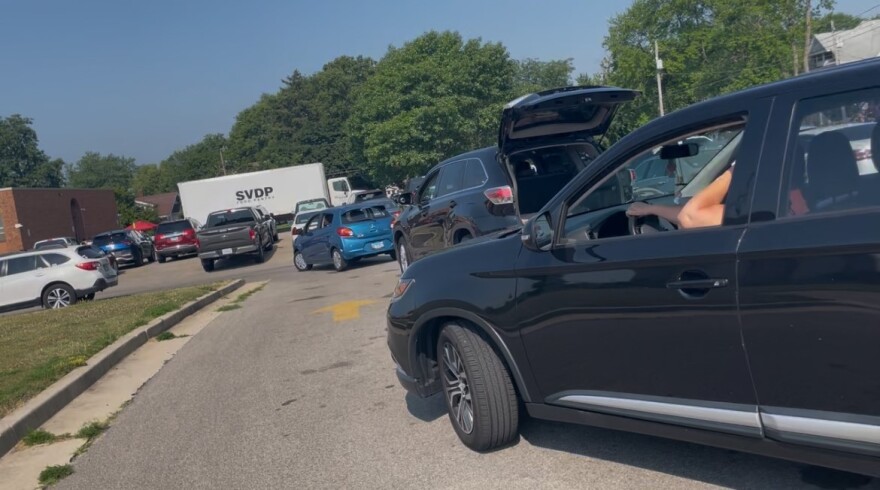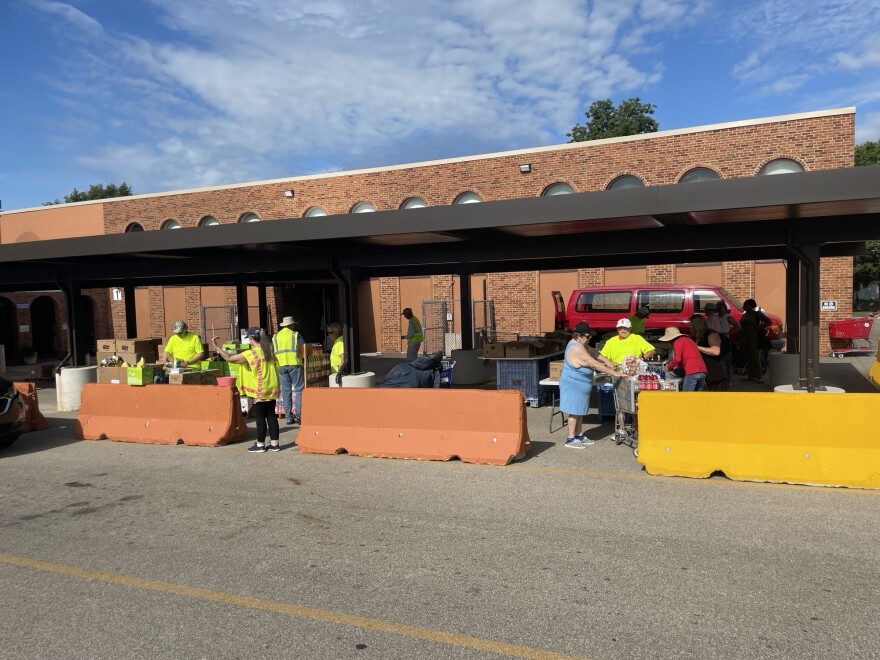Expanded work requirements under the recently-approved tax cuts and spending bill threaten to increase food insecurity in the Bloomington-Normal area and across the country.
Eligibility requirements to the Supplemental Nutrition Assistance Program [SNAP] — wrapped into the GOP megabill signed into law on July 4 — means about 360,000 Illinoisans could lose food assistance benefits, according to a statewide analysis.
More than 20,000 McLean County residents receive SNAP.
SNAP recipients must now work or volunteer 80 hours per month unless they have dependents age 14 or younger, are medically certified as physically or mentally unfit for employment or are pregnant. The law expands work requirements to all non-disabled adults, including those age 55-64, who were previously exempt.
The Illinois Department of Human Services does not have a timeline for implementing the policy changes. A statement on the agency's website states it is "deeply concerned" and is awaiting further direction from their federal counterparts.
The New York Times reports new work requirements could arrive before the end of 2025.
Republican lawmakers who pushed for the changes, including U.S. Rep. Darin LaHood, R-Dunlap, said the measures are intended to lower government costs and get more people back to work.
“Now that the economy is getting back on track and we're out of the COVID window … we’ve got to put in place provisions that cut back on our spending, and SNAP is one of those,” LaHood said in an interview with WGLT.
But some people who are working say they still need benefits — and can't access them.
Keelin Erbe is a Bloomington resident, health care professional and single mother of two toddlers. She said the bulk of her income is consumed by childcare and housing.
“I have applied for SNAP benefits, but I make about $100 [per month] too much,” she said. “As a single parent, it’s hard.”
Choosing to feed her daughter above herself was Erbe’s tipping point for recently visiting the St. Vincent DePaul food pantry in Bloomington. She said one night after dinner, her daughter still felt an empty stomach.
“She said, ‘Mommy, I’m hungry,’” Erbe said. “So, I gave her my food.”
Food insecurity resources stretched thin

The St. Vincent DePaul pantry is open every Monday and twice a month on Saturdays. Board member Dorothy Deany estimated about one-third of their clients who receive SNAP benefits are employed. Deany also said the pantry has clients like Erbe who don’t receive SNAP and work — but don’t earn enough to cover their expenses.
Deany said since the COVID pandemic, the number of households they serve skyrocketed. That was more than five years ago.
“Monday we were kind of slow,” she said of a recent food distribution, “but we still ended up serving about 480 households. That’s a good number of people. And then sometimes we’re well over 500. We’re a busy pantry.”
Food rationing
Inflation and climbing grocery prices contributed to higher numbers of visitors in the past two years to the pantry at Eastview Christian Church in Normal, too. According to pantry coordinator Diane Haab, the increase led to instituting a food rationing policy.
“We went from providing households food twice a month to only one time per month. We had to make that decision in order to stretch our dollars,” said Haab.
The pantry sees more than 50 new clients a month, said Haaby, adding a future loss in SNAP benefits means more families will struggle to put food on the table.
Both SVDP and Eastview Pantry source their food from Midwest Food Bank, headquartered in Normal, and Eastern Illinois Food Bank. In addition, they receive food donations from restaurants and other local suppliers.
Midwest Food Bank’s Chief Financial Officer Jada Hoerr recognizes federal funding changes may impact the agencies they serve — about 700 in Illinois. She said the organization is committed to serving despite the spike in visitors at those agencies.
“They’re seeing more people come to the agencies. They’ve seen about a 20% increase in people seeking their services,” said Hoerr. “But we are thankful that we are able to support the nonprofits.”
Hoerr said the food bank's food is donated from food manufacturers, food distributors and grocers.
“Very little of our food is purchased,” she said. “So, we are actively and always willing and able to go and procure food that is produced in excess and supply ... our partners.”
The Urbana-based Eastern Illinois Food Bank declined an interview, but provided a statement concerning the SNAP cuts and possible strain in meeting needs.
“These changes come at a time when we’re already working to meet a historic need — at least 1 in 8 of our neighbors are facing food insecurity, and the pantries and feeding programs in our 21-county network are serving twice as many people today as in 2022,” said president & CEO Kelly Daly.
“These cuts will further strain the budgets of local families and could be the tipping point for our neighbors who are one paycheck away from needing to visit a pantry. We remain dedicated to providing nutritious food to our neighbors experiencing hunger, thanks to the support from this generous community that empowers us to rise to challenges like these.”
Shifting costs to states
The new law also shifts administrative costs for the SNAP program to states. Beginning in 2028, states with an error rate of less than 6% will not cost-share. States with error rates at or above 10% will share 15% of the cost with the federal government.
A letter warning Congress that administrative cost-sharing could scrap the program from their state was signed by a bipartisan group of governors from 22 states, including Illinois.
“Congress is forcing states into an impossible ultimatum: either come up with new funding to backfill federal cuts or cut off families from essential food assistance," said the letter. "The idea that states will be able to respond to these massive cuts by backfilling with state resources is unrealistic. If states cannot meet the full cost share, they will need to cut SNAP enrollment or end their program entirely.”
Shifting costs to the state also threatens nonprofit food insecurity programs like Link Up, a statewide match program providing dollar-for-dollar produce to SNAP recipients.
“For every dollar that someone spends with their SNAP benefits, we match it with what is called a Link Voucher. It’s a one-to-one match they get to spend on fruits and vegetables,” said Matthew Ruffi, senior program manager at Link Up that receives both state and federal grants.
Ruffi said the program not only expands clients’ buying power but also benefits the economy of local farmers and producers.
“Clients no longer have to choose between ‘this or that,’” he said. “With the program, it becomes ‘this and that.' So, I can buy the bread, but I can also get fruits and vegetables that I need.”
That’s something Bloomington resident Rick is used to juggling. He has visited the St. Vincent DePaul pantry with his 13-year-old daughter Molly to supplement their food needs after they lost SNAP benefits.
Rick works as an underwriter and recently got a raise, meaning he now earns too much to continue qualifying for SNAP. Rick’s three children have special needs — one with a genetic disorder and two with autism. They’re a one income household because the children’s medical needs have kept Rick's wife from returning to the workforce.
“We definitely needed the benefits. It’s a safety net and it’s one of those things that should always be there, as long as you need it,” he said.
Rep. LaHood said social safety nets like Medicaid and SNAP are meant to be trampolines and not hammocks. But for Rick, rising property taxes, ballooning medical costs and inflation have worn down the springs.
“You can’t really call it a trampoline because you’re not really bouncing off of it,” he said.
Molly said she’s grown up too quickly because of food insecurity. According to data from the USDA, she's part of the 48.4% of SNAP households in Illinois’ 16th Congressional District that have a child.
“While most kids are worried about who likes them, I worry about what’s going to happen to me in the future. Will I be able to get a job that allows me to live?”


